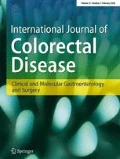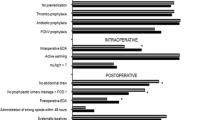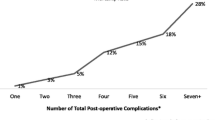Abstract
Aim: Postoperative ileus is an important factor of complications following gastrointestinal procedures. Its pathophysiology and the parameters, which may impact on its duration, remain unclear. The aim of this study was to measure the role of various clinical determinants on restoration of intestinal function after elective colorectal surgery. Methods: From July 2002 to September 2003, all patients who underwent laparotomy for colectomy (laparoscopic resections excluded) with either an ileotransverse, colocolic, or high colorectal anastomosis were entered in this prospective study. The intervals in hours between the end of the surgical procedure and passing of flatus (PG) and passing of stool (PS) were recorded by an independent investigator. PG and PS were eventually correlated with the following parameters: type of colectomy, early removal of nasogastric tube (NGT), mechanical bowel preparation (MBP), type of underlying disease, systemic administration of opiates, and surgical training (colorectal fellowship or other). Results: One hundred twenty-four patients were entered in this study. Four patients (3.2%) developed septic complications (3 anastomotic leaks and 1 intraabdominal abscess) and were excluded from the analysis. Median age in this population was 68 (range 30–95) years. Mean duration of postoperative ileus was 70±28 h (PG) and 99±34 h (PS). The type of colectomy, underlying disease, MBP, and early NGT removal failed, in univariate analysis, to correlate with the duration of postoperative ileus. By contrast, time intervals PG and PS were statistically shorter in the group of patients treated by a colorectal surgeon [56±23 vs 74±28 h (PG); 82±26 vs 103±35 h (PS), p=0.004], as well as in patients who received systemic opiates for less than 2 days [64±27 vs 75±28 h (PG), p=0.04; 88±32 vs 108±33 h (PS), p=001]. Conclusion: Restoration of normal intestinal function after elective open colectomy takes 3 (PG) to 4 (PS) days. In our series, specialized training in colorectal surgery has a positive impact on the duration of postoperative ileus. Surgical specialization should be considered an important parameter in future clinical trials aiming to minimize postoperative ileus.
Similar content being viewed by others
References
Livingston EH, Passaro EP (1990) Postoperative ileus. Dig Dis Sci 35:121–132
Huge A, Kreis ME, Jehle EC, Ehrlein HJ, Starlinger M et al (1998) A model to investigate postoperative ileus with strain gauge transducers in awake rats. J Surg Res 74:112–118
Luckey A, Livingston E, Taché Y (2003) Mechanisms and treatment of postoperative ileus. Arch Surg 138:206–214
de Jonge WJ, van den Wijngaard RM, The FO, ter Beek ML, et al (2003) Postoperative ileus is maintained by intestinal immune infiltrates that activate inhibitory neural pathways in mice. Gastroenterology 125:1137–1147
Kalff JC, Wolfgang HS, Simmons RL, Bauer AJ (1998) Surgical manipulation of the gut elicits an intestinal inflammatory response resulting in post-surgical ileus. Ann Surg 228:652–663
Cali RL, Meade PG, Swanson MS, Freeman C (2000) Effect of morphine and incision length on bowel function after colectomy. Dis Colon Rectum 43:163–168
Miedema BW, Johnson JO (2003) Methods for decreasing postoperative gut dysmotility. Lancet Oncol 4:365–372
Neudecker J, Schwenk W, Junghans T, Pietsch S, Bohm B, Muller JM (1999) Randomized controlled trial to examine the influence of thoracic epidural analgesia on postoperative ileus after laparoscopic sigmoid resection. Br J Surg 86:1292–1295
Basse L, Hjort Jakobsen D, Billesbolle P, Werner M, Kehlet H (2000) A clinical pathway to accelerate recovery after colonic resection. Ann Surg 232:51–57
Petros JG, Realica R, Ahmad S, Rimm EB, Robillard RJ (1995) Patient-controlled analgesia and prolonged ileus after uncomplicated colectomy. Am J Surg 170:371–374
Schwenk W, Bohm B, Haasae O, Junghans T, Muller JM (1998) Laparoscopic versus conventional colorectal resection: a prospective randomized study of postoperative ileus and early postoperative feeding. Langenbecks Arch Surg 383:49–55
Bohm B, Milsom JW, Fazio VW (1995) Postoperative intestinal motility following conventional and laparoscopic colorectal surgery. Arch Surg 130:415–419
Carli F, Trudel JL, Belliveau P (2001) The effect of intraoperative thoracic epidural anesthesia and postoperative analgesia on bowel function after colorectal surgery: a prospective, randomized trial. Dis Colon Rectum 44:1083–1089
Asao T, Kuwano H, Nakamura J, Morinaga N, Hirayama I, Ide M (2002) Gum chewing enhances early recovery from postoperative ileus after laparoscopic colectomy. J Am Coll Surg 195:30–32
Taguchi A, Sharma N, Saleem RM, Sessler DI, Carpenter RL, Seyedsadr M, Kurz A (2001) Selective postoperative inhibition of gastrointestinal opioid receptors. N Engl J Med 345:935–940
Dorrance HR, Docherty GM, O'Dwyer PJ (2000) Effect of surgeon specialty interest on patient outcome after potentially curative colorectal cancer surgery. Dis Colon Rectum 43:492–498
Smith JAE, King PM, Lane RHS, Thompson MR (2003) Evidence of the effect of specialization on the management, surgical outcome and survival from colorectal cancer in Wessex. Br J Surg 90:583–592
Porter GA, Soskolne CL, Yakimets WW, Newman SC (1998) Surgeon-related factors and outcome in rectal cancer. Ann Surg 227:157–167
Gillis CR, Hole DJ (1996) Survival outcome of care by specialist surgeons in breast cancer: a study of 3786 patients in the west of Scotland. BMJ 312:145–148
McArdle CS, Hole DJ (2004) Influence of volume and specialization on survival following surgery for colorectal cancer. Br J Surg 91:610–617
Author information
Authors and Affiliations
Corresponding author
Rights and permissions
About this article
Cite this article
Gervaz, P., Bucher, P., Scheiwiller, A. et al. The duration of postoperative ileus after elective colectomy is correlated to surgical specialization. Int J Colorectal Dis 21, 542–546 (2006). https://doi.org/10.1007/s00384-005-0050-0
Accepted:
Published:
Issue Date:
DOI: https://doi.org/10.1007/s00384-005-0050-0




